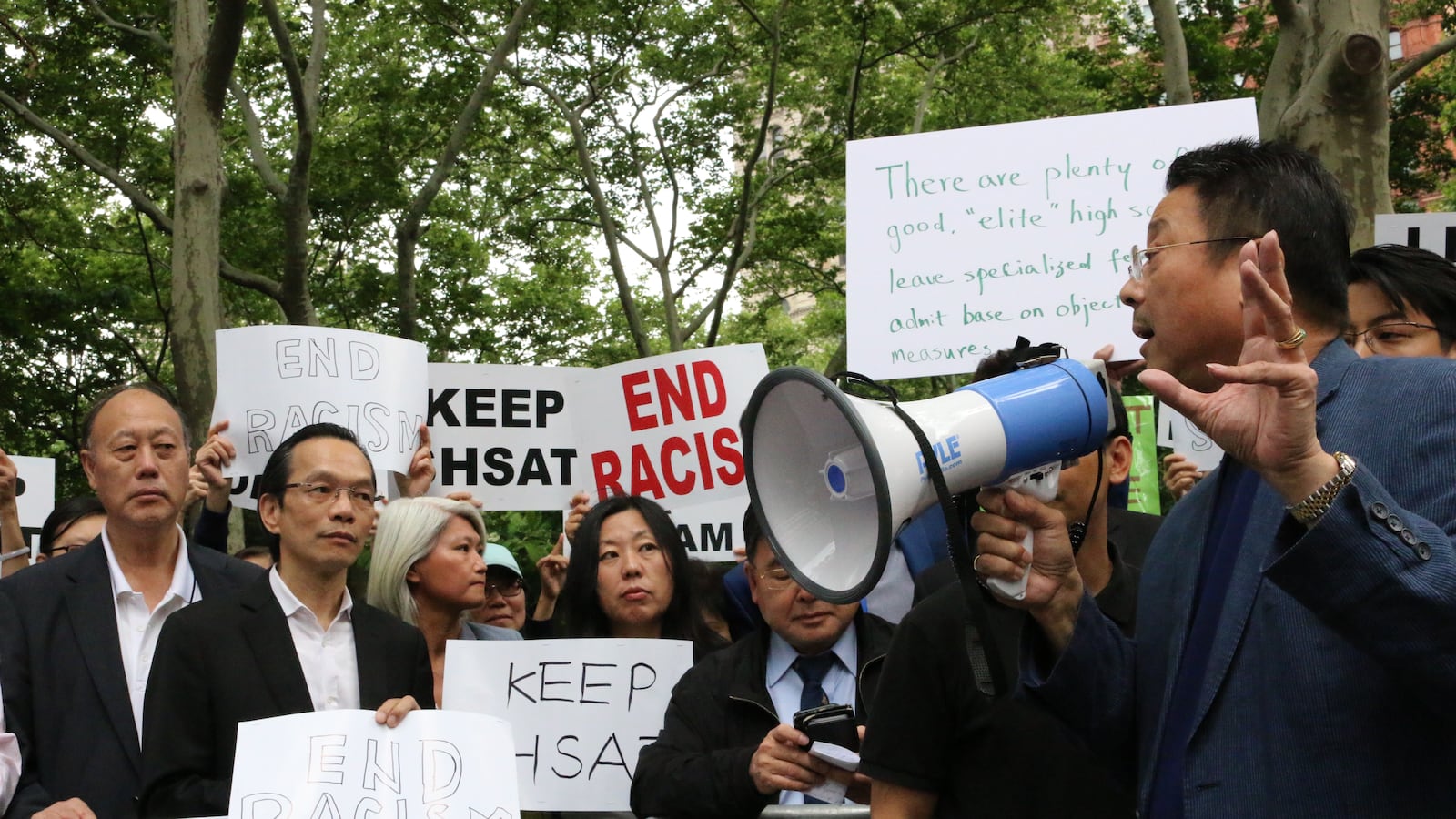Debate over the city’s plan to diversify New York City’s most elite high schools hasn’t let up since it was introduced last summer.
City officials have defended the plan against a lawsuit and at raucous public meetings. But even so, there appears to be little momentum to ensure the passage of a bill that would get rid of the specialized high school admissions test, or SHSAT, which is the sole criteria for entry into these schools.
Two proposed bills that would replace the test with other admissions standards have not seen the light of day in Albany, and even the mayor himself said he’s putting the issue on the back burner until mayoral control is extended.
“The entire focus is on achieving extension of mayoral control of education by the time of the budget; that’s where we’re focused on right now,” de Blasio said Thursday when asked if his office has been talking to lawmakers about the plan. “There’ll be other opportunities in the legislative session thereafter through the end of June to talk about other issues.”
In December, Queens Democrat Sen. John Liu, who chairs the Senate committee on New York City education, told Chalkbeat that the SHSAT debate would be “directly” and “comprehensively” addressed in his committee. But in a Wednesday interview, Liu said that calling a hearing over the SHSAT is not an “immediate priority,” citing mayoral control, school nutrition, “bullying protections,” and transportation as issues that are taking precedence.
“It’s simply not an immediate priority,” Liu said when asked if one of the bills that might enact the mayor’s plan would get a hearing this session. “It’s not a priority of mine. It’s not an issue that gets brought up among senators.”
Liu has said the mayor’s plan is a “non-starter” because de Blasio didn’t gather enough input from the Asian community. He’s also said the proposal does not do enough to prepare students of different backgrounds in elementary and middle school.
With mayoral control expiring June 30, it’s possible a decision over extension could drag out until the last minute, as it did in 2017 — perhaps leaving no room for a debate on specialized high schools. Lawmakers are also now in negotiations over the budget, which must be passed by April 1. Last year, the SHSAT issue was tabled at the end of the session, a few weeks after earning de Blasio’s support on June 2.
The racial makeup of the eight elite schools has caused ongoing controversy — and led to calls to diversify enrollment. Last year, 52 percent of Asian students and 27 percent of white students received offers to the schools, even though they make up just 16 and 15 percent of city students, respectively. In contrast, 10 percent of offers went to black and Hispanic students, who together make up about 67 percent of city students.
De Blasio’s diversity plan for the specialized high schools has multiple elements. One part, which is the subject of a lawsuit, is expanding the city’s Discovery program, which offers admission to high needs students who scored just below the cutoff for the SHSAT.
Another major element, which is what would require a change in state law, is getting rid of the SHSAT and instead granting admission to the top 7 percent of students at each city middle school, ranked by multiple measures of achievement. The plan has drawn scathing criticism from many Asian-Americans who feel unfairly targeted and who worry they would lose seats at some of the best high schools in the nation.
This year, there are at least two bills — sponsored by Brooklyn Democrats who’ve pushed the issue before — that directly address restructuring the admissions process: one from Sen. Kevin Parker, and another from Assemblyman Charles Barron.
Both call for phasing out the admissions exam by the 2020-2021 school year and giving offers to students citywide who are in the top 5 to 7 percent of their eighth grade classes and the top quarter of their grade. They propose any remaining spots go to a random selection of students who have at least a 3.7 GPA.
Last year, a similar bill from Barron, which de Blasio announced support for just weeks before the session ended, was tabled. At the time, Speaker Carl Heastie said lawmakers would take it up in 2019.
While both bills were sent to their respective committees — the education committee in the Assembly and the New York City education committee in the Senate — neither has been formally discussed. Typically, committee chairs or majority leaders choose to call hearings over bills.
The offices for Speaker Heastie and Assemblyman Michael Benedetto, chair of the education committee, did not return requests for comment.
De Blasio said he knew that a “very thorough legislative process” would come with removing the SHSAT as the sole criteria for admission to the specialized high schools.
“And ultimately, it is the decision of legislators, so they get to decide how and when it gets entertained,” de Blasio said Thursday. “But from my point of view, it’s not something we’re going to be focusing on until we get through this immediate issue [of mayoral control].”

